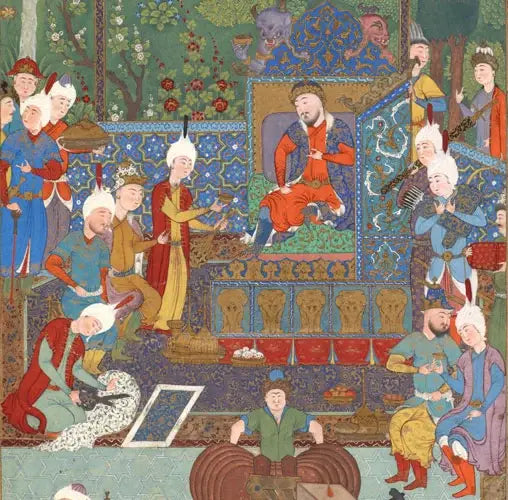Rite of Spring: Celebrating Nowruz, The Persian New Year

Dating back 2,600 years to the epoch of ancient Zoroastrianism, Nowruz (Farsi for “new day”), also known as the Persian New Year, is the celebration of the arrival of spring for more than 300 million people in Iran and throughout Central Asia, the Middle East, the Caucasus, and the Balkans—regions historically tied to the Silk Road. Beginning on the astronomical vernal equinox of March 20th or March 21st and lasting two weeks, Nowruz is, more symbolically, the honoring of light over darkness, joy over sadness, and good over evil. The mostly secular festival promotes the idea of peace and mutual understanding between families and neighbors, thereby encouraging reconciliation and solidarity between peoples and cultures with sometimes disparate customs and worldviews.
Since Nowruz inaugurates the start of spring, the traditional dishes prepared for family gatherings usually contain generous helpings of green herbs. Always served on New Year’s Day is sabzi polo ba mahi, fried fish presented atop basmati rice mixed with dill, parsley, and chives. Other popular specialties include kuku sabzi, an herb-and-spinach frittata; dolmeh barg, lamb-stuffed grape leaves; reshteh polo, toasted wheat noodles with saffron rice; and shekar polo, a sweet basmati-rice pilaf made with sugar, cinnamon, pistachios, raisins, and candied citrus peel. On the last day of Nowruz, Sizdah Bedar (or Nature’s Day), families escape to the countryside for an hours-long picnic.

Laroot’s vegetarian Nowruz Āsh (literally “New Year’s soup”) is based on heritage recipes for a deep-green noodle-based soup traditionally associated with good fortune for the coming year. Though we forgo the noodles to make the dish gluten-free, we keep the chickpeas, cannellini beans, and green lentils for their protein, fiber, and vitamin B content. An abundance of spinach provides vitamin C, while additions of parsley, cilantro, and dill offer essential micronutrients. Herbaceous, savory, and slightly tangy, the Nowruz Āsh, whether enjoyed in spring or fall, is a hearty reminder that sentiments of renewal can be felt whatever the season.


